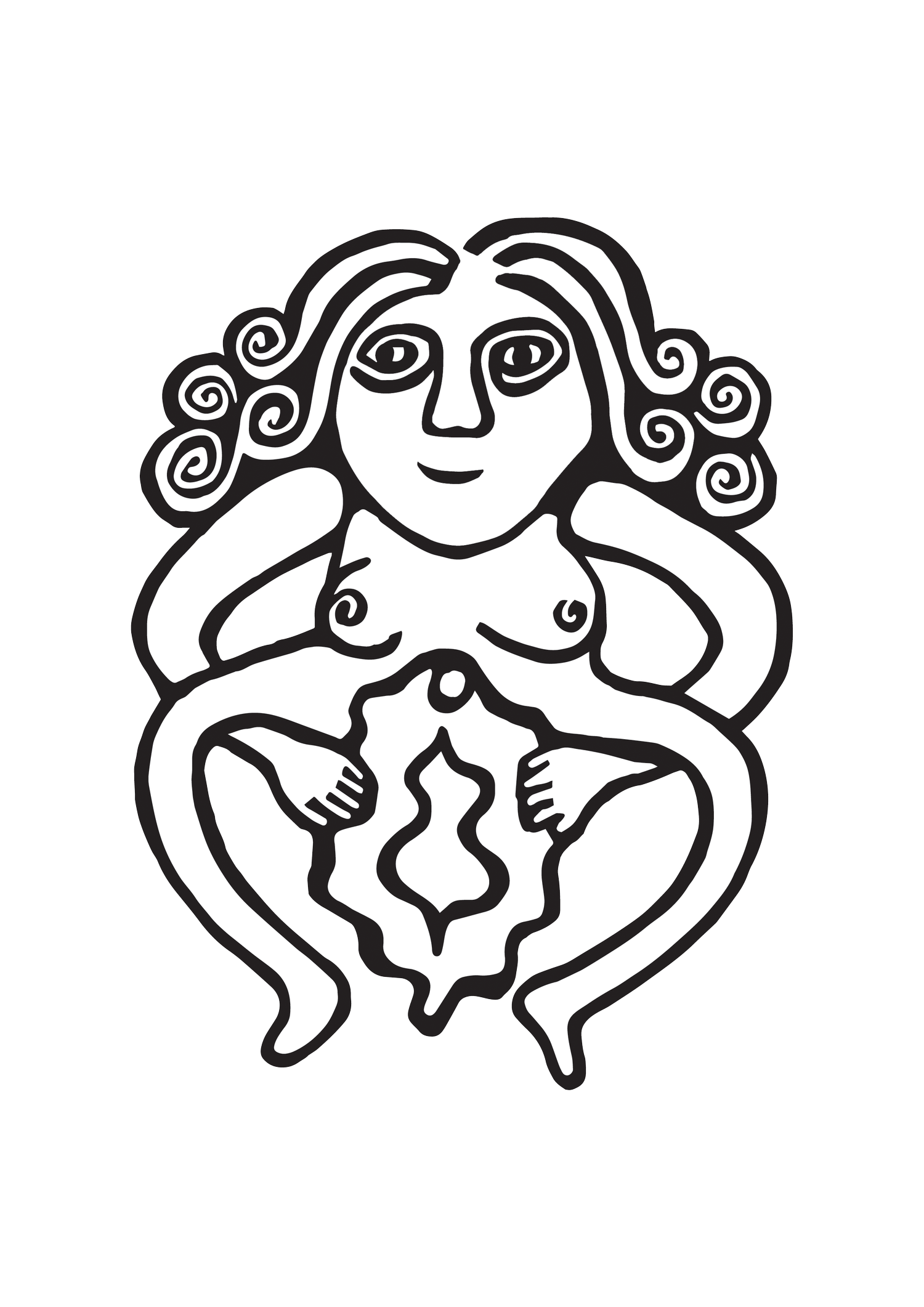2022
8 locations unveiled around Ireland and 1 location in London, UK.
Read about the meaning behind each location below (under image gallery).

The Grotto, St Mary's Church in Granard, Co. Longford

The Grotto, St Mary's Church in Granard, Co. Longford
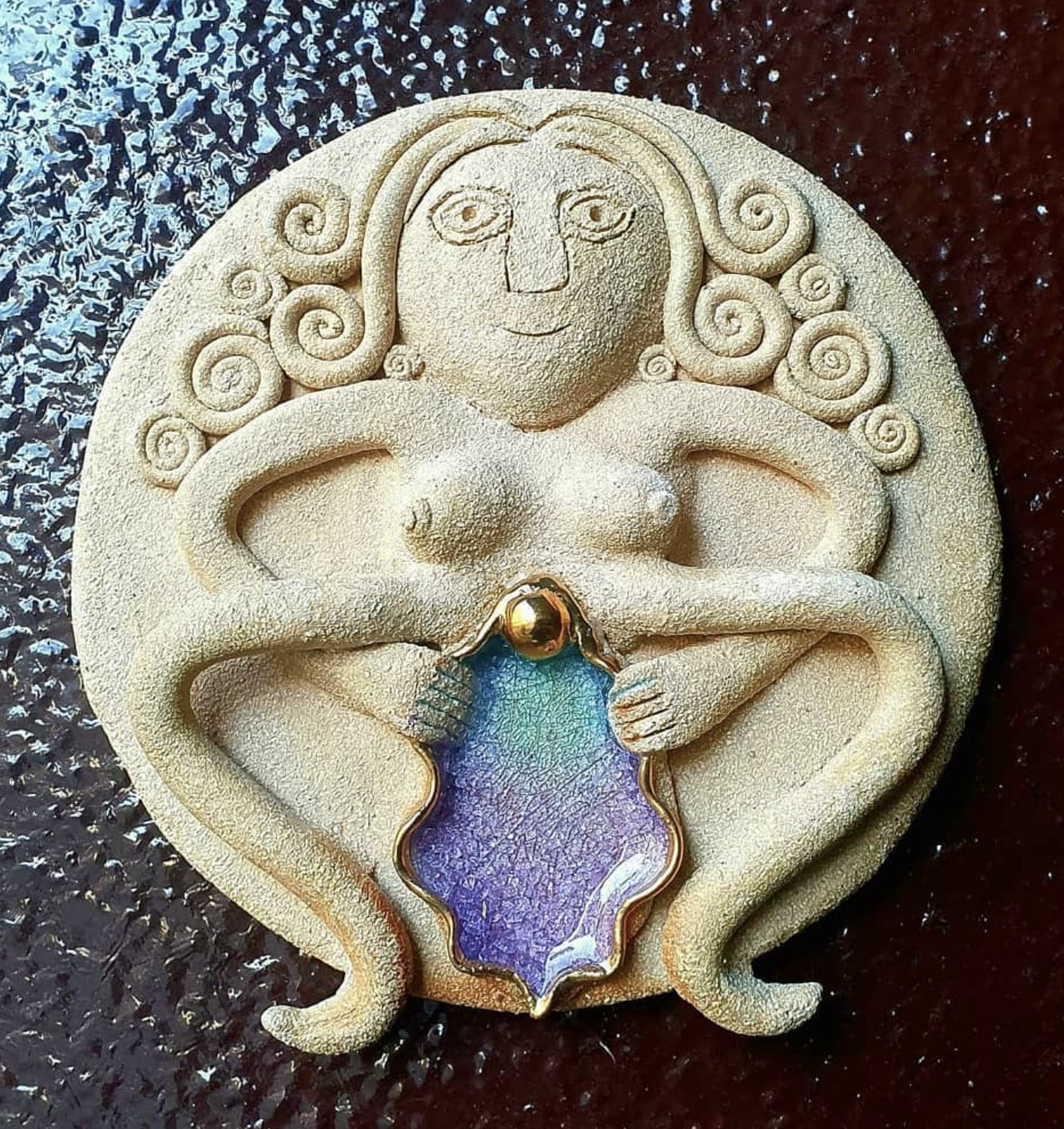
Wynn's Hotel, Abbey St, Dublin

Wynn's Hotel, Abbey St. Dublin

Grand Canal, Tullamore, Co. Offaly

Grand Canal, Tullamore, Co. Offaly

Poynders Court, London, UK

Poynders Court, London, UK

Harcourt St, Garda National Protective Services Bureau, Dublin

Harcourt St, Garda National Protective Services Bureau, Dublin

University Hospital, Galway

University Hospital, Galway

IFSC, Dublin

IFSC, Dublin

Crow St, Temple Bar: Women's Information Network Anonymous Telephone Line, Dublin

Crow St, Temple Bar: Women's Information Network Anonymous Telephone Line, Dublin

Bon Secours mother and baby home, Tuam, Galway

Bon Secours mother and baby home, Tuam, Galway
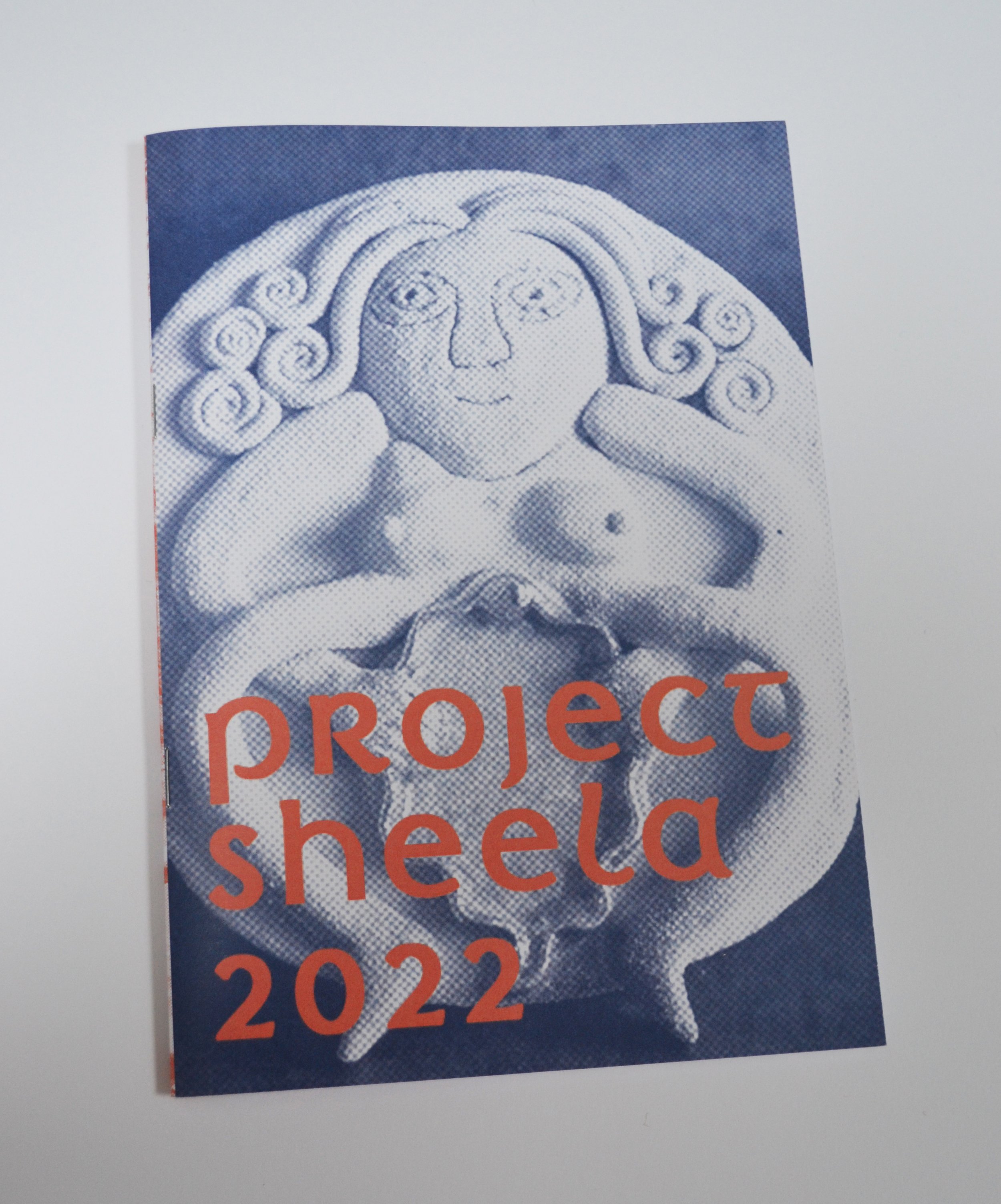
PS Zine 2023, Digital Print, 30 made. Documents all sheelas & locations from 2023.
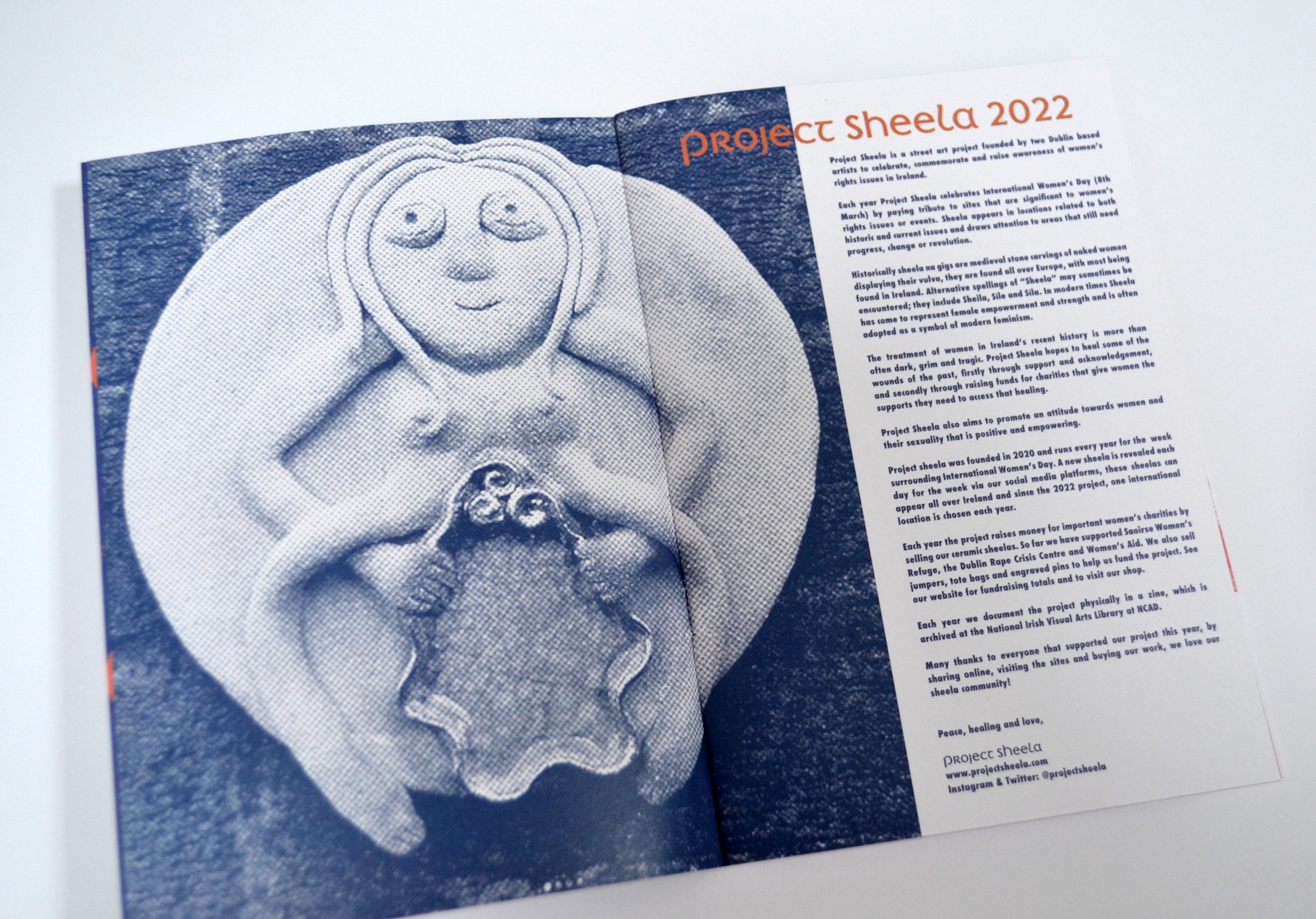
PS Zine 2023, Digital Print, 30 made. Documents all sheelas & locations from 2023.
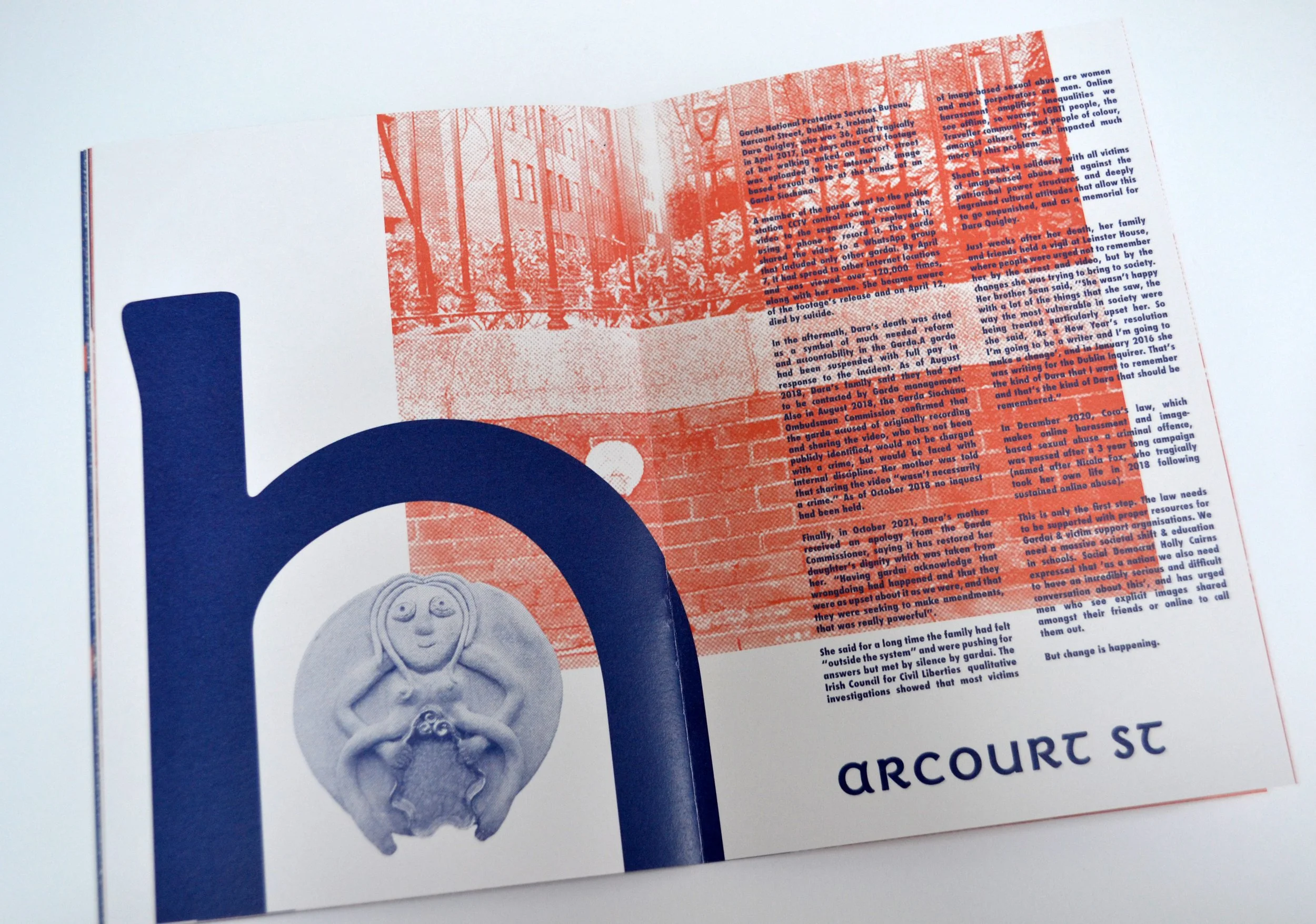
PS Zine 2023, Digital Print, 30 made. Documents all sheelas & locations from 2023.
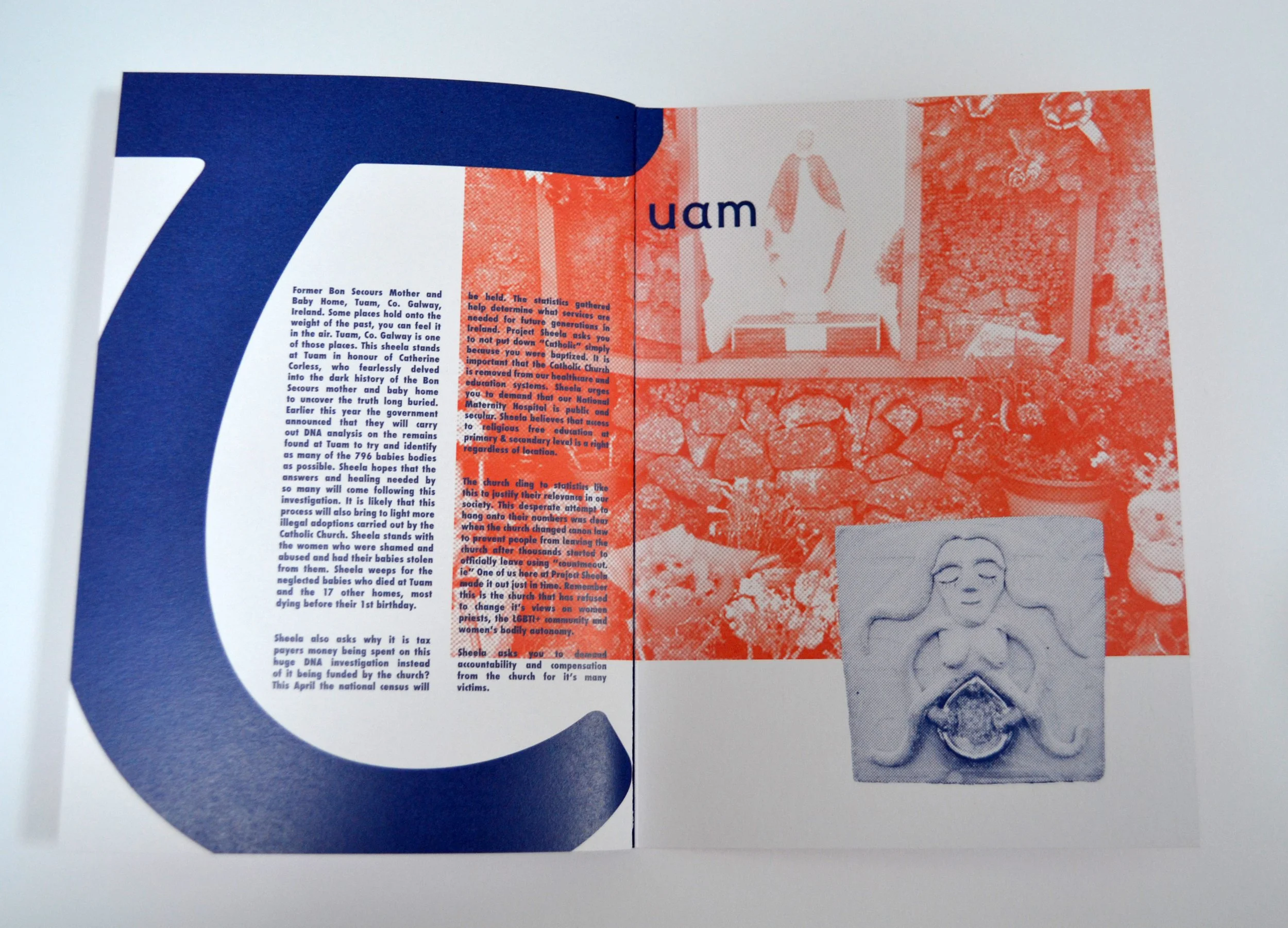
PS Zine 2023, Digital Print, 30 made. Documents all sheelas & locations from 2023.
-
The atmosphere is heavy at the grotto beside St Mary's Church in Granard Co. Longford. It was a cold wet day when we arrived with sheela, as it had been on the 31st January in 1984, when 15 year old Ann Lovett gave birth there, all alone. The story of Ann has been in our knowledge for as long as we can remember. Victims of catholic schooling the story was told to scare us about sex and teach us shame. At school we were shown abortions videos and given chastity talks. We were told that exploring our own body was deeply wrong and this was in the early 2000s. We can only imagine how Ann felt in a small town full of blame, judgement and oppression instigated by the Catholic Church.
Rosita Boland's two recent powerful articles about Ann Lovett have brought new information to light. Ann was not a shrinking violet, she was artistic and strong. Her boyfriend Ricky who was interviewed by Boland, claims that Ann did not go to the grotto out of fear or shame. He believes she went there as an act of protest. Ricky revealed that Ann had been assaulted. She would not disclose her attacker. Later after Ann's death, the local priest rushed to Ricky's house upon hearing Ann left him a letter, he demanded to read it and insisted it be destroyed. When asked for an interview by Boland the priest had his solicitor respond with his refusal. We believe that justice for Ann is yet to come.
Sheela pleads with you to not put "Catholic" down as your religion on the census this April simply because you were baptized. If you don't go to mass and don't agree with the oppression and abuse that the Catholic has inflicted on the people of Ireland and the world, put down "no religion" on the census.
We were saddened to see that there was no memorial for Ann at the grotto. It was a poignant reminder of the cover up and denial of what happened there. There was no memorial. Now there is.
-
Through all of Ireland's hardships and battles, Irish women have been front and centre.
Cumann na mBan (the Irishwomen's Council, C n mB for short) was founded in Wynne's Hotel, Dublin, April 1914. The founders were Agnes O'Farrelly, Agnes MacNeill, Nancy O'Rahilly, Louise Gavan Duffy, Mary Colum, and Mary McSwiney. It included both white-collar & working-class women.
C n mB was an Irish republican women’s paramilitary organisation who's primary objectives were: to advance the cause of Irish liberty and to organise Irishwomen in the furtherance of this objective, to assist in arming and equipping the Irish men for the defense of Ireland, & to form a fund for these purposes. They called it ‘The Defense of Ireland Fund’.
Throughout the Easter Rising, women played many pivotal roles, although their roles are unfortunately largely forgotten. A majority of women worked as Red Cross workers, couriers, or secured rations for the men. Other women gathered intelligence on scouting missions, carried messages, and carried explosives and arms from one stronghold to another. In the chaos, it was easy for the women to navigate Dublin inconspicuously. As C na mB officer Brigid Doherty explained, 'we could get through very often with dispatches where men would not have a hope.'
When the Rising was over, 77 women from the C na mB found themselves imprisoned in Kilmainham Gaol. They released most women within a few weeks because British authorities had little desire to intern a large cohort of women. Constance Markievicz, who claimed to have killed a police constable, was sentenced to death. They later released her on amnesty in 1917.The Rising had ended, but for the women of the C na mB there was still work to be done. Members continued to fight for Irish freedom and women’s rights. They took a leading role in keeping the memory of the 1916 leaders alive. The women organized prison relief and canvassed for Sinn Féin in the 1918 general election, in which Countess Markiewicz was elected Teachta Dála.
Sheela honors all of the amazing and often forgotten women who fought for Irish independence and women's rights, & who still continue to do so.
-
Grand Canal, Tullamore, County Offaly, Ireland. Just 8 weeks ago 23 year old Ashling Murphy was murdered while out for a run after work in broad daylight, for no other reason than she was a woman. We won't talk about Ashlings case any further being mindful that the trial is yet to take place. You won't find sheela at the exact spot where this tragedy took place, out of respect for the family and as it is a crime scene. You'll find sheela under this bridge along the grand canal way in Tullamore. Sheela is there to remember Ashling and stand against femicide.
It is a good opportunity however for us to talk about why Ashlings case was so publicized and why it affected so many of us. Ashlings death and the media frenzy around it painted the perfect story. The perfect victim, squeaky clean, a teacher, young, white, Irish and beautiful. And her killer, a stranger, pure evil, someone who set out to cause harm that day. But the reality is that most women that lose their lives violently, are killed by a man they knew, and often a man they loved. 87% of the 244 women killed by men in Ireland since 1996, knew their killer. Often in a moment of madness where all control is lost. Most of these men are remorseful. We are not defending these men, we are simply trying to understand. Maybe it's easier for us to digest, good vs evil, the perfect Hollywood formula. Easier for us to dismiss the killer as something 'other', not like us. But like it or not these killers are people too.
Maybe we should be thinking about these boys and men and what made them so angry. How can we help them express their emotions safely to prevent these crimes. The violent pornography that is presented in our society as normal does not play an innocent role in all this. One of us here at Project Sheela has personal experience of losing a loved one to femicide. Their killer will be released next year. Do we ever think about what happens to the killers in prison? Do they get help? The average time served for a life sentence in Ireland is 18 years. These killers are among us. Do you think they deserve a second chance?
-
Waterloo Rd, Burlington Rd, Wilton Rd and the canal end of Baggot St make up a very historic red-light area, although not so in use any more. Just over the bridge from Waterloo on Haddington Rd, there is a health service for women in the sex trade called the Women's Health Project. The WHP also provide support to victims of trafficking. The project provides a free sexual health drop-in clinic with no appointment necessary. It includes full sexual health testing, treatment and contraception. Its existence in proximity to the historic red-light area is strategic.
Although this area is not so in use anymore, a website called Escort Ireland (EI) absolutely is. Advertising prostitution is illegal in Ireland; EI operates from a foreign jurisdiction to evade this law. It holds a monopoly over the sex trade in Ireland and in 2015 turned a profit of over 6 million. Paying for sex is also illegal, since 2017.
On the EI website men can peruse women's pictures, look at their 'favourites' (sex acts the women will allegedly do) and read their 'reviews'. Men rate women out of 5 stars for 'physical appearance', 'location', 'satisfaction', 'value for money' and 'overall experience'. The reviews, both 'positive' and 'negative', are disturbing, dehumanising and revealing. Either it is acceptable for men to rate and review women's appearance, personality and sexual 'performance' or it is not. Money being exchanged does not negate this misogyny.
Sex traffickers have advertised women on this website and there are no consequences.
Last year, prostitution was named as male violence against women in the Third National Domestic, Sexual and Gender-Based Violence Strategy. Now we need to commit to that and end these websites that facilitate rape, sexual exploitation, sex trafficking and abuse, and which allow the men to review the women they exploit afterwards. This is commercialised sexual abuse on a large scale.
Sheela asks you to please sign this petition in our IG stories and help to end Escort Ireland and all websites that facilitate this particular and very hidden form of sexual crime (link in stories), and to read more about EI.
If you disagree with our message maybe our project isn't for you. Yes we believe that legalizing the sex trade will only make it easier for women and girls to be trafficked and abused. Yes we do believe it should be illegal for men to pay to abuse women. No we don't think woman engaging in sex work should be punished or shamed. Yes we have spoken to sex workers and former sex workers. No we don't have to agree or engage in debate with everyone that comments on our page, who has the time for that? No we don't have to leave comments on our posts that oppose our message. No we are not religious, we are atheist. We believe that feminism is about what's best for all women not just individuals. We understand that this is very nuanced but for every woman that says they choose to be in the sex trade, there are thousands of women and girls, many migrants and minors, who are forced/coerced into it. This website facilitates in the trafficking of these women. The reviews are extremely revealing and show how the men really feel about women.
-
Dara Quigley, who was 36, died tragically in April 2017, just days after CCTV footage of her was uploaded to the internet - image based sexual abuse at the hands of an Garda Síochána (Irish police).
A member of the garda went to the police station CCTV control room, rewound the video to the segment, and replayed it, using a phone to record it. The garda shared the video to a WhatsApp group that included only other gardai. By April 7, it had spread to other internet locations and was viewed over 120,000 times, along with her name. She became aware of the footage's release and on April 12, died by suicide.
In the aftermath, Dara's death was cited as a symbol of much needed reform and accountability in the Garda.
A garda had been suspended with full pay in response to the incident. As of August 2018, Dara's family said they had yet to be contacted by Garda management. Also in August 2018, the Garda Síochána Ombudsman Commission confirmed that the garda accused of originally recording and sharing the video, who has not been publicly identified, would not be charged with a crime, but would be faced with internal discipline. Her mother was told that sharing the video "wasn't necessarily a crime." As of October 2018 no inquest had been held.
Finally, in October 2021, Dara's mother received an apology from the Garda Commissioner, saying it has restored her daughter's dignity which was taken from her. "Having gardaí acknowledge that wrongdoing had happened and that they were as upset about it as we were, and that they were seeking to make amendments, that was really powerful".
She said for a long time the family had felt "outside the system" and were pushing for answers but met by silence by gardaí. The Irish Council for Civil Liberties qualitative investigations showed that most victims of image-based sexual abuse are women and most perpetrators are men. Online harassment amplifies inequalities we see offline, so women, LGBTI people, the Traveller community, and people of colour, amongst others, are all impacted much more by this problem.
Sheela stands in solidarity with all victims of image-based abuse and against the patriarchal power structures and deeply ingrained cultural attitudes that allow this to go unpunished, and as a memorial for Dara Quigley.
Just weeks after her death, her family and friends held a vigil at Leinster House, where people were urged not to remember her by the arrest and video, but by the changes she was trying to bring to society. Her brother Sean said, ''She wasn’t happy with a lot of the things that she saw, the way the most vulnerable in society were being treated particularly upset her. So she said, 'As a New Year’s resolution I’m going to be a writer and I’m going to make a change’, and in January 2016 she was writing for the Dublin Inquirer. That’s the kind of Dara that I want to remember and that’s the kind of Dara that should be remembered."
In December 2020, Coco’s law, which makes online harassment and image-based sexual abuse a criminal offence, was passed after a 3 year long campaign (named after Nicola Fox, who tragically took her own life in 2018 following sustained online abuse).
This is only the first step. The law needs to be supported with proper resources for Gardaí & victim support organisations. We need a massive societal shift & education in schools. Social Democrat Holly Cairns expressed that 'as a nation we also need to have an incredibly serious and difficult conversation about this', and has urged men who see explicit images shared amongst their friends or online to call them out.
But change is happening.
-
Savita Halappanavar on 28 October 2012 at University Hospital Galway. She was 17 weeks pregnant. The cause of death was recorded as severe sepsis, E.coli in the bloodstream and a miscarriage at 17 weeks.
On 3 November 2012, friends and family of the Halappanavars contacted local abortion rights groups (Galway Pro-Choice) to find out what they could do. Galway Pro-Choice put them in contact with The Irish Times journalist Kitty Holland. Abortion rights groups then organised on the Irish Choice Network (ICN) email group before the story broke.
In the story, her husband, Praveen Halappanavar, spoke of how he and his wife asked multiple times for a medical termination but were told that 'this is a Catholic country'. She was denied a life saving abortion as the heartbeat of the fetus was still detected, despite being unviable. The story was reported across every outlet in Ireland, dominated the political agenda of the coming weeks and made headlines across the world. Huge protests and marches erupted throughout Ireland, with the chant and hashtag 'Never Again'.
In May 2018, as Ireland prepared to head to the polls for a referendum on abortion, Savita’s parents gave permission for their late daughter’s image to be used as part of the Together for Yes campaign, which sought to repeal Ireland’s Eighth Amendment.
In a video for Together for Yes, Savita’s father Andanappa Yalagi said: “I hope that the people in Ireland will remember the fate of our daughter Savita on the day of the referendum and vote ‘yes’ so that what happened to us won’t happen to other families.”
On May 25, 2018, the Republic of Ireland voted 66.4 percent to 33.6 percent in favor of repealing the Eighth Amendment.
The legislation was ultimately passed in the Dáil Éireann on December 5, 2018, and on December 20, 2018, it was signed into law by President Michael D. Higgins.
This Sheela honors Savita in 2022, on the 10 year anniversary of her death.
'Sorry we were too late. We are here now. We didn't forget you.' A note from the Savita mural, Richmond St. 2018.
-
Urantsetseg Tserendorj, originally from Mongolia but living in Dublin with her family for a number of years, was rushed to the Mater Hospital following an attack on January 20th 2021. She was walking home at work from 9.30pm at the IFSC. She remained in a critical condition for two weeks before she passed away on February 3rd 2021. She had a son and a daughter. Her husband Ulambayar stayed by her bedside and close family members flew over from Mongolia.
A 15-year-old boy, who cannot be named as he is a minor, has been charged with her murder and is due to face trial at the Central Criminal Court later this year. The boy had also attempted armed robbery on numerous other women.
Her family received much love and support from Irish people - cards, messages and money, however, violence against minority women such as women of colour, working class women and women from the travelling community is far underreported in the media.
244 women have died violently in this country since 1996, when Women’s Aid began the Femicide Watch project to record such deaths. Sheela stands with them and their family and friends, and demands an end to male violence against women. We need to get to the root cause.
From her family at her memorial ceremony:
“She worked as a physical education teacher in her hometown of Rashaant soum and was a respected educator and humanist who dedicated her heart to educating young people to develop basketball, volleyball and tennis.
She made a valuable contribution to the development of the sport of 'Mongolian volleyball' in Ireland and successfully represented her country in many international and domestic competitions. Your humane, compassionate, hard-working, warrior-hard-working, vigilant, and humane spirit will forever be etched in our hearts.
-
67947-double O, women have the right to know!
The Society for the Protection of Unborn Children (SPUC) would seek legal action against anyone who was giving information out about how to access abortion in the UK and other countries, because in Ireland in the 80s and 90s, it was illegal to do so. The only way forward for activists was to set up an anon phone line to help those in crisis get the information they so desperately needed. It ran from the late 80s for almost 10 years, providing callers with information to help them travel if they needed an abortion. It was operated by a small group of women who remained anonymous and worked from a small room in 6 Crow Street, Temple Bar, for a few hours each week on Wednesdays and Saturdays. The phone number was spray-painted in bathrooms, written on placards, chanted and printed on leaflets, which were then photocopied.
In total, over 3k women rang an anonymous, volunteer-run phone line to get basic medical advice in Ireland in the 90s. We've come a long way!
The leaflets were handed out at the GPO and the number was chanted by an amazing group of activists. Women would ask for a couple of leaflets, say that they were going to photocopy them as much as they could and give them to everybody they knew. Then, those women would do the same. Viral before the internet!
Check out this amazing podcast about these inspiring activists. Mary Gordon & Mary Ryder are interviewed about their struggles both spreading the number and answering the calls. The ways they got the number out to the public were ingenious.
It also features Senator Ivana Bacik about how she and other Students Union members were taken to court over their publishing of this phone number in student guidebooks. Mary Robinson acted as legal council for the students who were brought to court. The very next year, she became the 1st female President of Ireland.
Sheela is in awe of the amazing activists who have helped countless women, and she celebrates you!!
Thank you so much to Deirdre Kelly for the amazing podcast and location suggestion.
Podcast: How the Yes Was Won, Ep.3.
-
Some places hold onto the weight of the past, you can feel it in the air. Tuam is one of those places. This sheela stands at Tuam in honour of Catherine Corless, who fearlessly delved into the dark history of the Bon Secours mother and baby home to uncover the truth long buried. Earlier this year the government announced that they will carry out DNA analysis on the remains found at Tuam to try and identify as many of the 796 babies bodies as possible. Sheela hopes that the answers and healing needed by so many will come following this investigation. It is likely that this process will also bring to light more illegal adoptions carried out by the Catholic Church. Sheela stands with the women who were shamed and abused and had their babies stolen from them. Sheela weeps for the neglected babies who died at Tuam and the 17 other homes, most dying before their 1st birthday.
Sheela also asks why it is tax payers money being spent on this huge DNA investigation instead of it being funded by the church?
This April the national census will be held. The statistics gathered help determine what services are needed for future generations in Ireland. Project Sheela asks you to not put down "Catholic" simply because you were baptized. It is important that the Catholic Church is removed from our healthcare and education systems. Sheela urges you to demand that our National Maternity Hospital is public and secular. Sheela believes that access to religious free education at primary & secondary level is a right regardless of location.
The church cling to statistics like this to justify their relevance in our society. This desperate attempt to hang onto their numbers was clear when the church changed canon law to prevent people from leaving the church after thousands started to officially leave using "countmeout.ie" One of us here at Project Sheela made it out just in time. Remember this is the church that has refused to change it's views on women priests, the LGBTI+ community and women's bodily autonomy.
Sheela asks you to demand accountability and compensation from the church for it's many victims.
